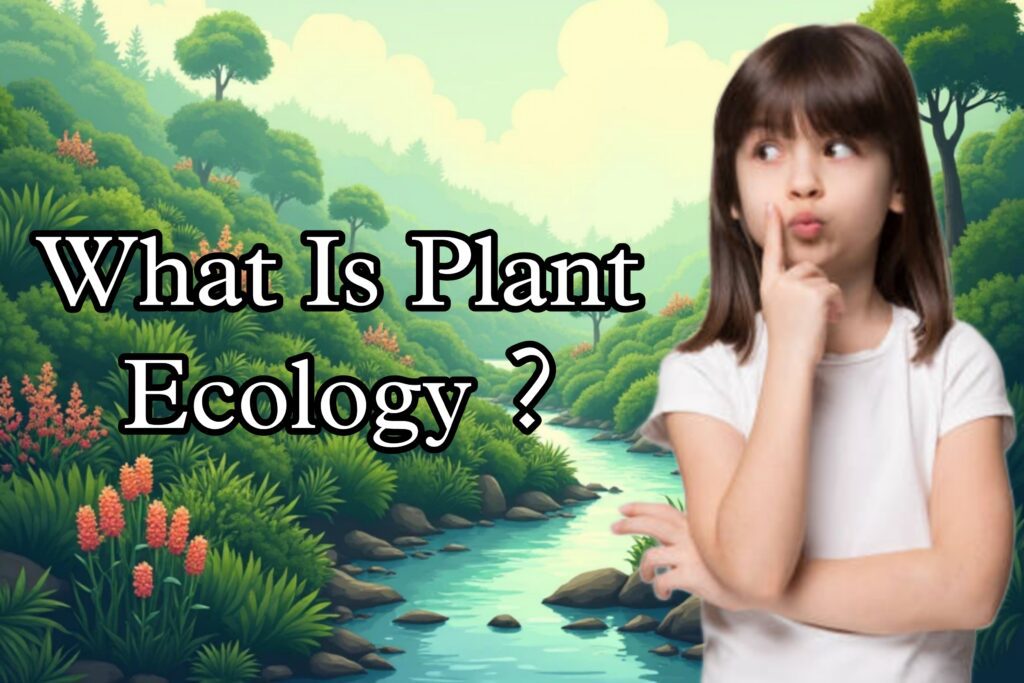What Is Plant Ecology
Plant ecology is a branch of ecology that focuses on the relationships between plants and their environment. It studies how plants interact with each other, animals, microorganisms, and physical factors like light, temperature, soil, and water. The goal is to understand the role plants play in ecosystems, including:
1. Plant Communities and Ecosystems in Ecology
In plant ecology, plant communities are groups of species that coexist within specific environmental conditions, forming the basis of ecosystems. Ecology examines how these plant communities function and interact with other organisms and their environment, shaping biodiversity and ecosystem stability.
- Example: In forest ecology, distinct plant communities occupy different layers, from the forest floor with mosses and ferns to the canopy with tall trees, each interacting with light, moisture, and nutrient cycles.
2. Plant Adaptations in Ecology
Adaptations are specialized features that allow plants to thrive under specific ecological conditions. Plant ecology studies these adaptations, such as structural, physiological, and reproductive traits, to understand how plants respond to environmental pressures like drought, temperature, and herbivory.
- Example: In desert ecology, cacti have adapted to store water in their thick stems and reduce water loss with spines. These adaptations help them survive and thrive in the harsh conditions of desert ecosystems.
3. Nutrient Cycling in Plant Ecology
Nutrient cycling is a fundamental process in ecology that plants play a vital role in. Plant ecology examines how plants absorb, store, and release essential nutrients like nitrogen and phosphorus, which circulate through the ecosystem and support other organisms.
- Example: In grassland ecology, grasses take up nutrients from the soil and, through decomposition, return these nutrients back, creating a cycle that sustains the ecosystem’s productivity and plant growth.
4. Plant Interactions (Competition and Mutualism) in Ecology
Plant ecology explores how plants interact with each other and other organisms, such as through competition, mutualism, and predation. These ecological interactions affect plant health, reproduction, and survival, influencing the overall ecosystem structure.
- Example: In tropical forest ecology, large trees compete for sunlight, which drives tall growth, while smaller plants like epiphytes form mutualistic relationships by attaching to larger trees to access light without soil competition.
5. Succession and Community Dynamics in Ecology
Succession is the process by which plant communities in ecology change and develop over time, often following ecological disturbances like fire or flooding. Plant ecology studies these patterns to understand ecosystem resilience and regeneration.
- Example: In forest ecology, after a fire, early-successional species like grasses and shrubs appear first. Over time, slower-growing trees establish, leading to a mature forest that supports a diverse ecosystem.
6. Plant-Soil Interactions in Ecology
Plant ecology also studies the complex relationship between plants and soil, as plants rely on soil for nutrients, water, and support. In return, plants contribute organic matter and help shape the soil environment, supporting other organisms.
- Example: In agricultural ecology, legumes such as beans form mutualistic relationships with nitrogen-fixing bacteria, enriching the soil with nitrogen—a crucial nutrient that benefits other crops and plants in the ecosystem.
7. Response to Environmental Changes in Plant Ecology
Plant ecology examines how plants respond to environmental changes like climate change, pollution, and habitat loss. These responses can result in changes in plant distribution, growth, and flowering times, impacting entire ecosystems.
- Example: In alpine ecology, plants adapted to cold climates may migrate to higher altitudes as temperatures rise due to climate change, altering the composition and function of alpine ecosystems.
8. Conservation and Restoration Ecology in Plant Ecology
Plant ecology plays a critical role in conservation and restoration efforts by applying knowledge of plant interactions, adaptations, and community dynamics to restore ecosystems and maintain biodiversity. This helps ensure that plant communities continue to support ecosystem services, such as pollination, water purification, and soil health.
- Example: In prairie ecology, restoration projects often involve reintroducing native grasses and wildflowers to support pollinators, enhance soil health, and restore the prairie’s natural ecosystem functions.
These core concepts illustrate how plant ecology connects plant life with the broader ecological context, providing valuable insights for conservation, environmental management, and sustainable practices.
Read Also: Plants Botanical Name, Morphology, Economic Importance
Read Also: 12 Powerful Medicinal Plants for Malaria Treatment – Rajkumar Logre

